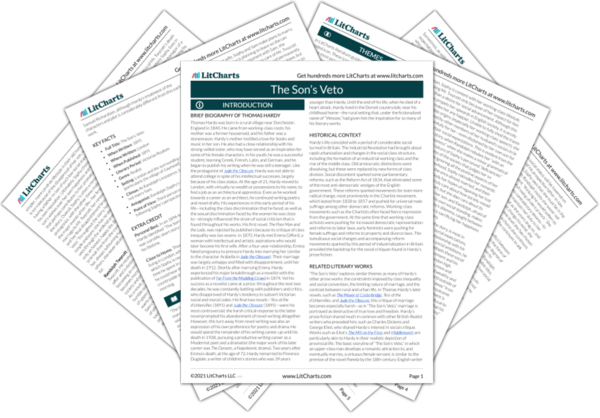Family Duty vs. Desire
The primary conflict in “The Son’s Veto” is between Sophy’s desire for happiness, embodied in her relationship with Sam, and her sense of duty, embodied in her maternal relationship with her son Randolph. Sophy’s revived romantic relationship with Sam, the man she almost married in her youth, offers her a glimpse of happiness and freedom that had seemed impossibly out of reach when she became widowed. But Randolph, who is obsessed with…
read analysis of Family Duty vs. DesireFreedom vs. Immobility
In “The Son’s Veto,” Sophy’s life is starkly divided between two halves: her early life as a working-class maid, and her later life as a “lady,” after marrying (and then being widowed by) Mr. Twycott. The dividing line between those two halves is her foot injury. Her collapse on the stairs while taking care of Mr. Twycott, incapacitating her for life, is the event that first changes her life irrevocably, making it…
read analysis of Freedom vs. Immobility
Regret
“The Son’s Veto” is ultimately a story about the unfulfilled possibilities of Sophy’s life. It is a story of “what ifs”: what if Sophy had married Sam, as she had originally planned? What if she had chosen to keep working after her foot injury, rather than marrying Mr. Twycott? What if she had disregarded her son Randolph’s wishes and married Sam after her husband’s death? As her life becomes increasingly…
read analysis of Regret







Social Class vs. Human Flourishing
The distinctions of social class—and the accompanying invisible rules that govern how people within each class are expected to act—shape the lives of each character within “The Son’s Veto.” Mr. Twycott, an Anglican parson, must uproot his life to avoid potential societal scorn for marrying Sophy, his former servant. After her marriage to Mr. Twycott, Sophy must confront a complex set of social expectations that she is unprepared to meet, making her isolated…
read analysis of Social Class vs. Human Flourishing